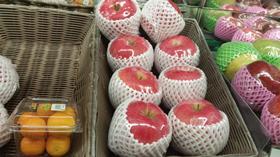
Taiwanese shoppers are expected to boycott Japanese fruit this Chinese New Year amid deep-seated distrust in its safety.
Consumers fear for public health as the Taiwanese government considers lifting a five-year ban on produce from Japanese prefectures affected by the 2011 Fukushima nuclear disaster.
So extreme is consumer concern over radioactive contamination that ten public hearings held by the Taiwanese Cabinet to discuss the issue on 12-14 November were disrupted by protests and descended into chaos, according to newspaper reports.
Last week Taiwan’s Office of Food Safety announced there was no timetable for lifting the ban, and the controversy continued to escalate.
Taiwan suspended food imports from the Japanese prefectures of Fukushima, Ibaraki, Tochigi, Gunma and Chiba on 25 March 2011 over fear of radioactive contamination from the Fukushima Nuclear Power Plant meltdown.
But last month the Taiwanese government announced plans to lift the ban in two phases, with strict controls and inspections, allegedly after mounting pressure from Japan – a key market for Taiwanese goods.
This prospect has alarmed Taiwanese consumers, who have lost faith in the regulation of their food supply since a series of food-safety scandals highlighted glaring inadequacies in the system.
Over the last five years, the Taiwanese press has reported findings of plasticisers in drinks, jams and pastries; tainted starch products; fake olive oil; and tannery waste and diseased animal corpses mixed into food oil.
Although the government has responded with tough punitive action, the creation of an Office of Food Safety, and the appointment of 70 extra inspectors to the Taiwan Food and Drug Administration, consumers remain sceptical.
Experts say Taiwan’s food supply is still alarmingly unregulated, and that an estimated two-thirds of the nation-state’s food providers operate under the radar of government regulators.
Where Japanese produce is concerned, rumours abound that food from the banned prefectures has been finding its way to Taiwan for years after being repacked in Tokyo and issued with fake certificates of origin.
“People feel cheated,” Ignacio Chang, a produce supplier with the Taiwanese She Sun Dae import group, told Fruitnet. “According to press reports, 75 per cent of Taiwanese women – many of whom are mothers and who are in charge of the family shop – say they will not easily trust Japanese food again.
“Most Taiwanese oppose the government policy to lift the ban on Fukushima produce,” he added. “They are worried about the effects of radiation. They aren’t convinced by government checks – only 5 per cent of products are checked per container, which is not enough to persuade people they aren’t from the radiation polluted areas.
“This Fukushima issue is having a huge effect on demand for all Japanese fruit,” Chang continued. “Consumers are looking instead at produce from anywhere but Japan. I think this will last into Chinese New Year. Both consumers and suppliers will choose high-end fruit from anywhere but Japan.”



